Table of Contents
- 19+ Child Questionnaire Templates in PDF | MS Word
- 1. Questionnaire for Parents of Children Example
- 2. Children’s Physical Activity Questionnaire in PDF
- 3. Child Questionnaire Template
- 4. Satisfy Children’s Questionnaire Format
- 5. Child and Adolescent Questionnaire Template
- 6. Simple Child Health Questionnaire
- 7. Childhood Experiences Questionnaire Template
- 8. Child Health Condition Questionnaire in PDF
- 9. Child Behaviour Questionnaire Template
- 10. Child Questionnaire Form
- 11. Childhood Experience Questionnaire Template
- 12. Basic Child Resources Questionnaire
- 13. Sample Child’s Food Questionnaire
- 14. Child History Questionnaire Form in PDF
- 15. Child Care Family Questionnaire Template
- 16. Standard Child Development Questionnaire
- 17. Sample Child Questionnaire Form
- 18. Children Questionnaire Checklist for Parents
- 19. Child Questionnaire Work Program Template
- 20. Professional Child Parent Questionnaire
- What questions can you ask your child?
- What is a Behavioural Questionnaire?
- What are the Curious Questions?
- What questions can you ask your toddler?
- What are the basic tips for improving the way you talk to your child?
- Frequently Asked Questions
19+ Child Questionnaire Templates in PDF | MS Word
Survey questions to ask a young person is a questionnaire to know what the child is thinking and to understand behavioral patterns. Survey questions can be asked to youngsters to completely understand them better as well as to come up with ways to handle them with less complexity. These types of questions can be asked to children of all ages. Have a look at the child questionnaire templates provided down below and choose the one that best fits your purpose.

19+ Child Questionnaire Templates in PDF | MS Word
1. Questionnaire for Parents of Children Example
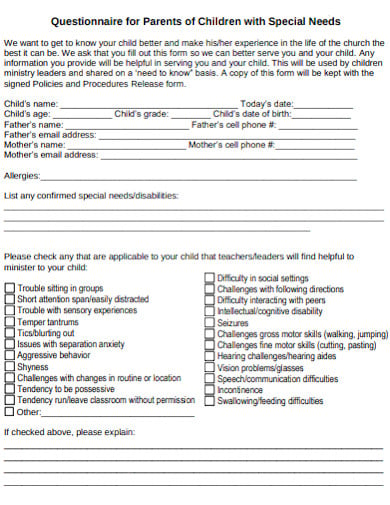 pineville.church
pineville.church2. Children’s Physical Activity Questionnaire in PDF
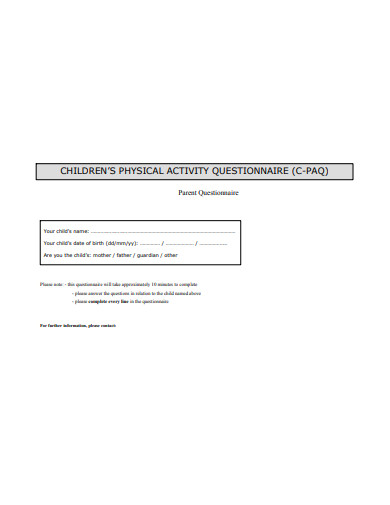 ac.uk
ac.uk3. Child Questionnaire Template
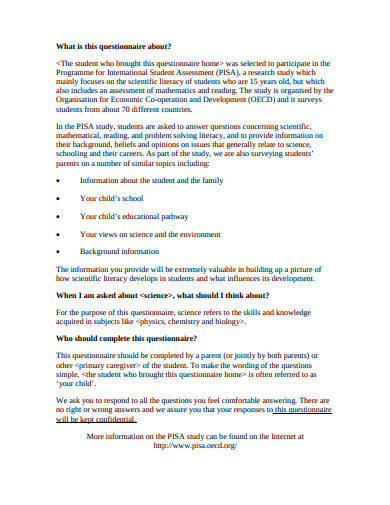 oecd.org
oecd.org4. Satisfy Children’s Questionnaire Format
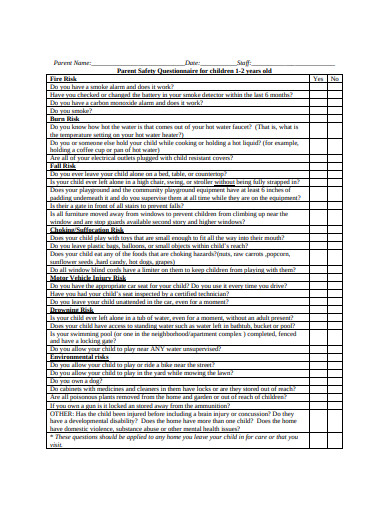 atriumhealth.org
atriumhealth.org5. Child and Adolescent Questionnaire Template
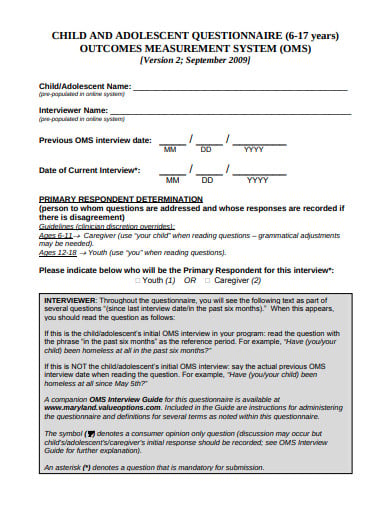 beaconhealthoptions.com
beaconhealthoptions.com6. Simple Child Health Questionnaire
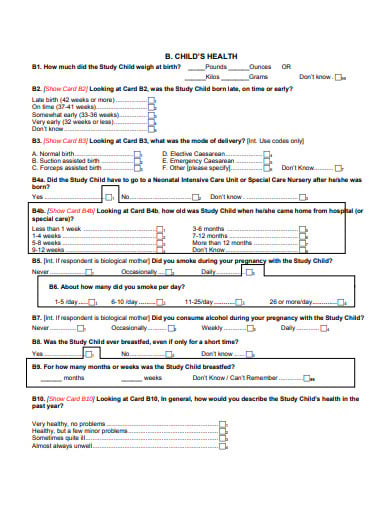 ucd.ie
ucd.ie7. Childhood Experiences Questionnaire Template
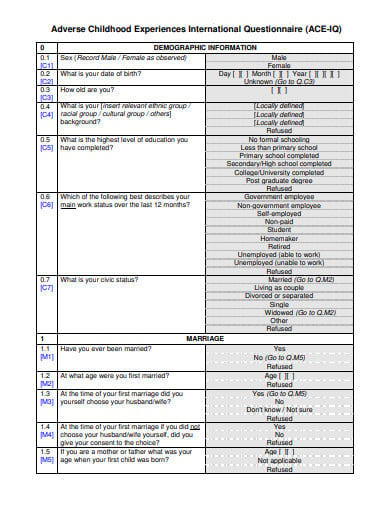 who.int
who.int8. Child Health Condition Questionnaire in PDF
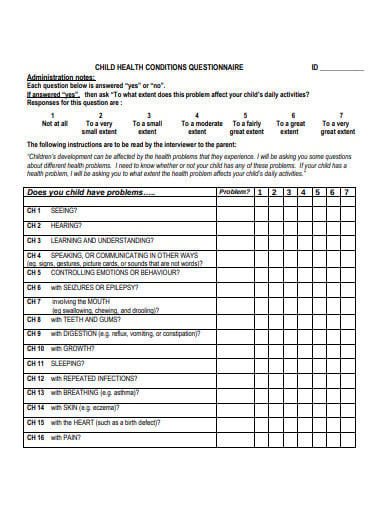 canchild.ca
canchild.ca9. Child Behaviour Questionnaire Template
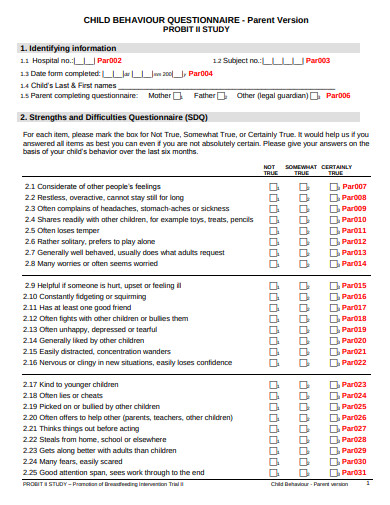 ac.uk
ac.uk10. Child Questionnaire Form
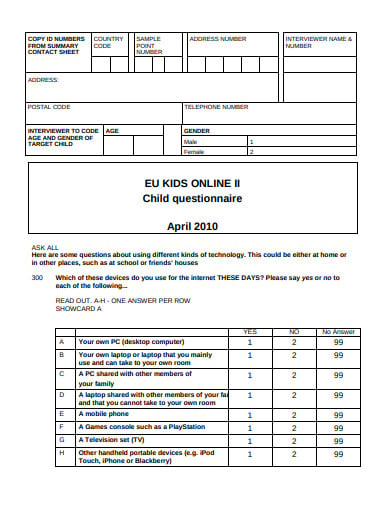 ac.uk
ac.uk11. Childhood Experience Questionnaire Template
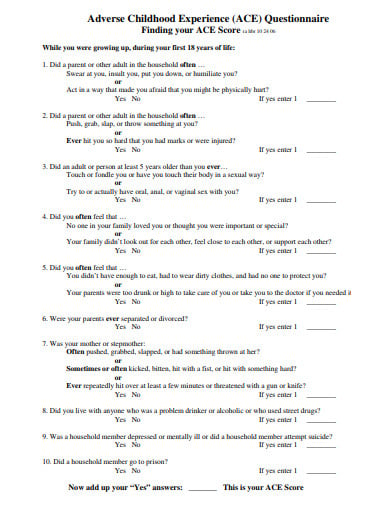 ncjfcj.org
ncjfcj.org12. Basic Child Resources Questionnaire
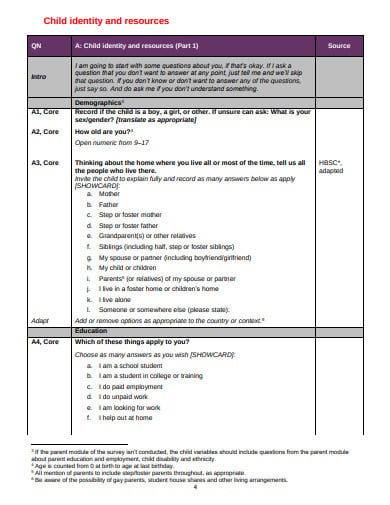 globalkidsonline.net
globalkidsonline.net13. Sample Child’s Food Questionnaire
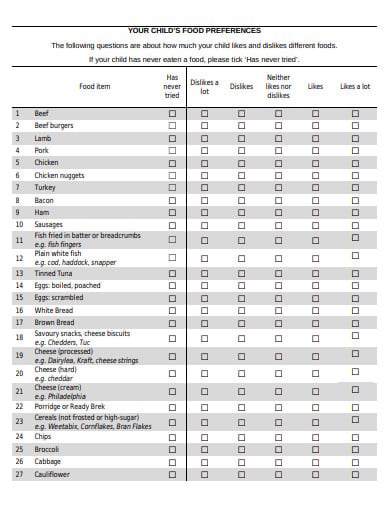 ac.uk
ac.uk14. Child History Questionnaire Form in PDF
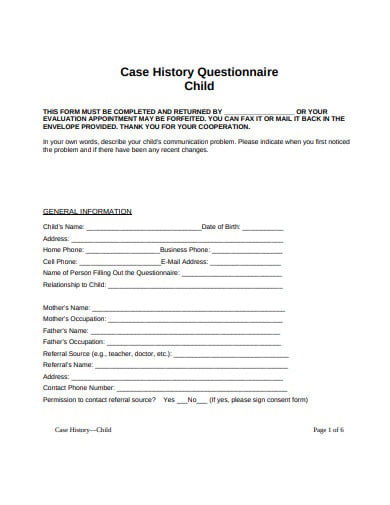 mercy.edu
mercy.edu15. Child Care Family Questionnaire Template
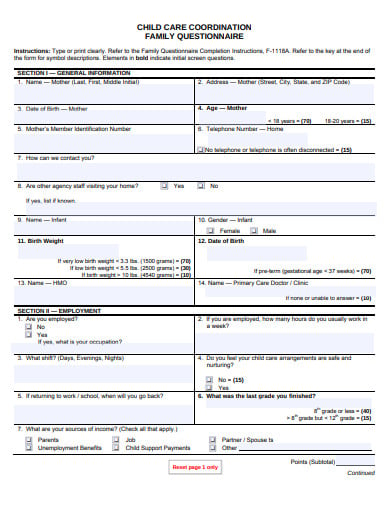 wisconsin.gov
wisconsin.gov16. Standard Child Development Questionnaire
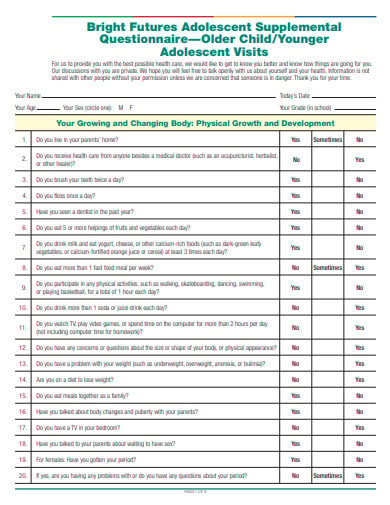 aap.org
aap.org17. Sample Child Questionnaire Form
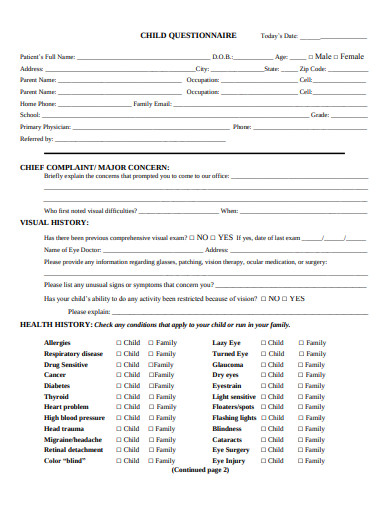 visualhealthlearning.com
visualhealthlearning.com18. Children Questionnaire Checklist for Parents
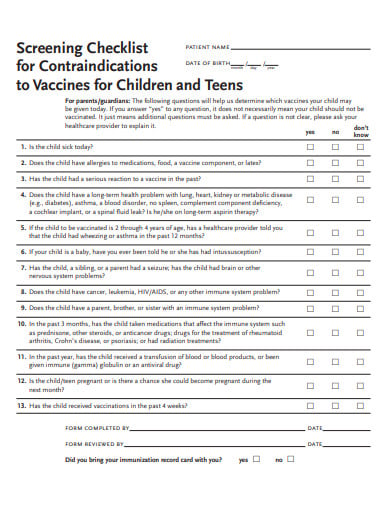 immunize.org
immunize.org19. Child Questionnaire Work Program Template
 hollandcollege.com
hollandcollege.com20. Professional Child Parent Questionnaire
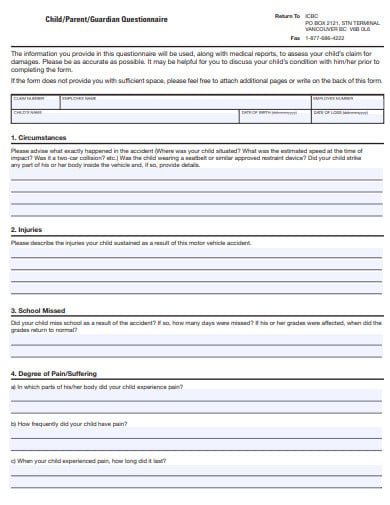 icbc.com
icbc.comWhat questions can you ask your child?
Given below are questions to ask children about their day at school which you can refer to:
- Tell me about the best part of your day.
- What was the toughest thing you had to do today?
- Did any of your classmates do anything entertaining?
- Tell me about what you learn in class.
- Whom did you play with today?
- Do you think mathematics or any subject is too easy or too hard?
What is a Behavioural Questionnaire?
Personality questionnaires evaluate personal behavioral choices, that is, how you like to work. They are not bothered with your skills, but how you see yourself in the way you relate to others, your approach to problems, and how you deal with feelings and emotions.
What are the Curious Questions?
With curious open questions, the person asking the question doesn’t have an answer and doesn’t mean to judge or blame. The purpose is to learn more and understand.
What questions can you ask your toddler?
Check out the following questions provided on toddler interview questions:
- What is something your mother/father always says to you?
- What makes you happy?
- What makes you unhappy?
- What makes you smile?
- How old are you?
- How old is your mother?
- How old is your father?
- What is your preferred thing to do?
What are the basic tips for improving the way you talk to your child?
- Use your child’s name
- Use confident and positive language
- Connect with your child using eye contact
- Use amplification suitably
- Propose options and choices
- Keep it easy
- Keep away from grumbling
- Design and anticipate good manners
Frequently Asked Questions
What is the purpose of a questionnaire?
A questionnaire is an analysis device as well as a collection of queries or alternative sorts of causes for the goal of accumulating knowledge from respondents. Although questionnaires are usually created for demographic analysis of the responses, this is not always the situation.
What are the advantages of using a questionnaire?
The main advantages of using questionnaires are:
- they are comparatively easy to examine
- they are accustomed to library faculty and managers
- a big sample of the given population can be reached at comparably low cost
- they are easy to administer
- the setup is common to most respondents
What’s the difference between a questionnaire and a survey?
There is a vital variation between a questionnaire and a survey is that a survey is described as the evaluation of experiences or ideas of a group of people via questions as opposed to a questionnaire which is described as a collection of written or printed questions with an answer choice made to handle a survey.
What makes a good questionnaire?
A good online questionnaire should ask respondents only about their own practices. Respondents should have the first-hand experience related to the questionnaire. Good online questionnaires should always consist of the emotional element.
What is the questionnaire technique?
A questionnaire is represented as an inquiry instrument that consists of a set of queries or different sorts of prompts that intends to accumulate knowledge from a respondent. A form could be a set of queries usually used for analysis functions which may be each qualitative as well as quantitative in nature.

